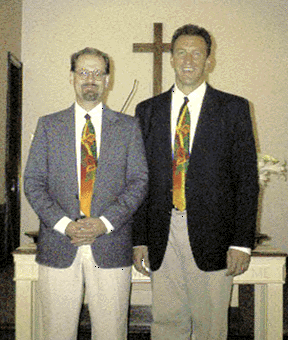He further goes on to say that it was through his study of the church fathers and the development of liturgical traditions that liberated him with respect to his views on church tradition.
He says a lot more than that, actually, that is highly problematic, and has been addressed by a number of folks since his conversion a few years ago. I wrote an entire chapter on Beckwith’s explanation of his own views as a “Protestant,” and how he had remained very much in the middle of the Tiber River, theologically and philosophically, until his full return to the Roman side of that river. I have decided to post that chapter over the course of the next week, so I will not repeat it here. But consult the portion on Beckwith’s comments on sola scriptura and you will see what I mean.
To be honest, the Catholic doctrine of the church has garnered a greater appreciation for me of not only church tradition but the significance of the visible church. I think we protestants have been historically too dismissive of tradition and tend to undermine the authority and presence of the ecclesiastical body.
Mrs. Robinson has already succumbed to the primary deception of Rome: the either/or conundrum. Rome presents the idea that either you have their view of the infallible church standing in the mists of time, or, you have yourself and your Bible under a tree. There is nothing in between. And, of course, there is plenty in between. Many of us have very high views of the church, her purpose, role, and authority. Mrs. Robinson may only be aware of modern American evangelicalism and its common sub-biblical views of the church, but that is only to be ignorant of the history of the Reformation itself. But it is a huge leap to move from “the church is necessary, the church is a divine institution” to “the church of Rome is the mother of all churches, infallible.” If Mrs. Robinson wants a higher ecclesiology, her Reformed heritage could have provided her with all sorts of examples of high, and biblical, ecclesiology.
Upholding scriptural authority has somehow created a laissez-faire attitude with respect to the unity of body that Christ sought (John 17:20-21) and that the RCC seeks with respect to doctrine and church practice.
I would challenge Mrs. Robinson’s straight-line reasoning from “uphold the divine nature and authority of Scripture” to “sub-biblical views of the church and true Christian unity.” How does she propose to make this connection? Mere observance that “some who uphold scriptural authority have a sub-biblical view of the church and the unity thereof” is not itself an argument. Is there not an inconsistency in upholding scriptural authority and then ignoring the very teachings of Scripture itself?
But far more to the point is the observation that Christian unity is not based upon ecclesiastical infallibility, Roman or otherwise. It is a unity of common confession, a unity birthed by the Spirit of God who brings the people of God to a knowledge of Jesus Christ and faith in Him and His gospel. That kind of unity is the very unity ripped and shredded by Rome’s constant overthrow of biblical norms and its insistence upon defining unbiblical speculation and teaching as dogma. So once again, if Mrs. Robinson is truly concerned about true Christian unity, should she not see Rome’s self-serving claims and actions over the course of history as one of the primary stumbling blocks toward the accomplishment of that unity?
When Luther nailed his 95 Theses on the Wittenberg door, he had no intention of dismantling the church but reforming practices that had been corrupted.
True, however, Rome’s reaction was that of a political system, not a church. Does Mrs. Robinson confess that the papacy of Luther’s day was not just corrupt, but utterly opposed to the gospel of grace? Does that not impact the claims of modern Roman Catholic apologists regarding the “2000 year old church” and the “consistent teaching” thereof? And once Rome anathematized Luther, what was he to do? Was he wrong to say “Here I stand, I can do no other?” And given that Rome has gone even farther away from the gospel since 1521 (defining as dogma such mythological teachings as the Immaculate Conception, Papal Infallibility, and the Bodily Assumption of Mary), should we be any less bold in our stand today?
While I do not agree with the authoritative status of the Pope as the succession of the apostolic witness, I do think there is something to be said for the preservation of historic Christianity and ecclesiastical unity that the papal office seeks to uphold.
Rejection of Rome’s papal pretensions is not a mere matter of agreement or disagreement. That is like saying, “I do not agree with the prophethood of Joseph Smith.” No, I reject it as a soul-destroying lie, just as I do the pretensions of a man dressed in flowing robes in a mansion in Rome who claims to be the Vicar of Christ on earth, infallible in his teaching authority. The Apostle Paul did not simply “disagree” with the Judaizers, did he? There is everything proper in recognizing the ability of Christians to “disagree” on secondary or minor issues. But we are talking about foundational things here, things that define our faith and our worship.



